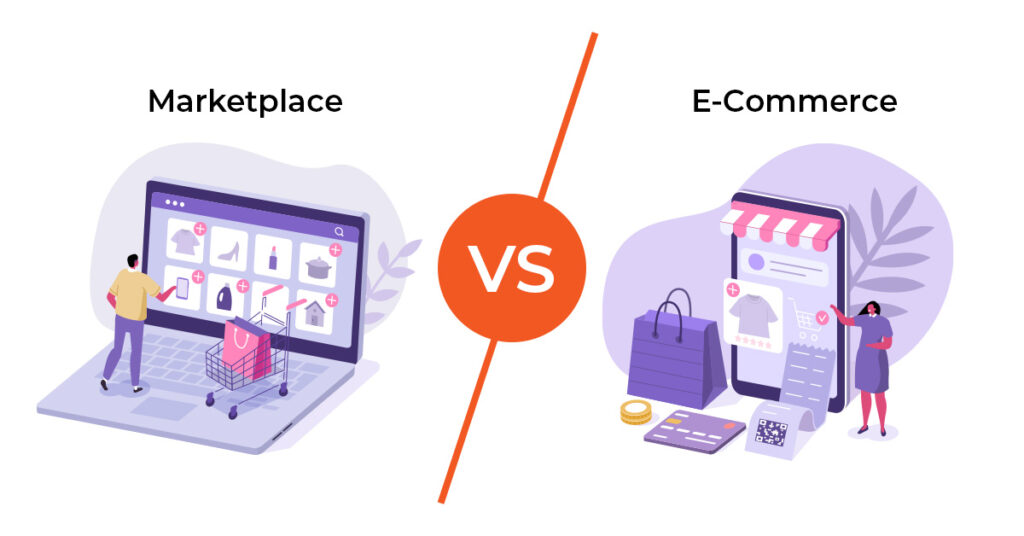The terms marketplace and e-commerce are often used interchangeably by people new to online selling. While both are online stores that generally sell a diverse range of products, there are several considerable differences between them. If you are planning to sell your products online, understanding the differences between the two is essential.
Take a look at 10 of the biggest differences between online marketplaces and e-commerce websites-
1. One Brand vs Multiple Brands
The primary difference between the two is how they function. Online marketplaces, such as Amazon, allow multiple brands or sellers to list and sell their products on their online platforms.
On the other hand, an e-commerce store is generally an online platform used by a brand to sell its products. For instance, Apple launched its e-commerce store in India in 2020. However, its products are also available on other online marketplaces like Amazon.
2. Revenue Generation
Marketplaces do not sell their own products on their platform and generate revenue through commissions. They receive a commission every time someone purchases a product from their platform.
But e-commerce platforms generally sell products of a particular brand and generate revenue from their sales.
3. Inventory Size
Needless to say, as marketplaces sell all the different types of products from multiple brands, they have a significantly larger inventory. This also increases the chances of customers finding a product of their liking.
E-commerce stores sell products of a single brand and generally have a smaller inventory.
4. Store Management
The marketplace is responsible for managing the online platform for all the sellers. In most cases, even the marketing aspect is managed by the marketplace.
But if you are running an e-commerce store of your brand, you will be entirely responsible for the management and marketing.
5. Investment
Brands generally don’t have to spend a lot of money to get listed and start selling on popular marketplaces in India.
But this might not be the case with an e-commerce store. Right from creating an online store, security, payment processing, product listing to delivery, starting and managing an e-commerce platform can be very expensive.
6. Store Traffic
Popular marketplaces such as Amazon, Flipkart, etc., already have a massive following in the country. Millions visit their website every month. So, the chances of selling more products are higher with a marketplace.
If you are starting your online store, one of the biggest roadblocks will be to get traffic. You will be fully responsible for brand awareness, optimization, SEO, SMM, and other marketing initiatives. But this will also provide you with the freedom to work on a custom strategy that can make your brand stand apart.
7. Dedicated Audience
You can also find marketplaces that cater to a specific product category, such as beauty, apparel, sports, etc. These platforms are a preferred shopping destination for people every time they want to purchase anything from those product categories. In other words, they have a dedicated audience who already visits their website.
With an e-commerce store, it can be very challenging for you first to figure out your target audience and then reach them.
8. Reliability and Trust
What do you think a customer will prefer? An online marketplace that he/she regularly uses for purchasing a variety of products or an e-commerce store they have landed upon for the first time? It all boils down to reliability and trust.
As people already shop from marketplaces, it is easier for them to trust the available products. On the other hand, it can be very complex and time-consuming for a brand or e-commerce store to build that trust and reliability.
9. Order Delivery
Another vital aspect of selling your products online is product delivery. Most of the top marketplaces generally offer delivery services. So, when someone purchases your product, the marketplace will deliver it for you. You will have to pay the delivery charges to the marketplace.
With an e-commerce platform, you will be fully responsible for order deliveries. If you offer country-wide delivery, you are sure to need a dedicated team to handle this process.
10. Mobile App
Most of the marketplaces now have their mobile apps. As the number of people shopping from their smartphones is rising in India, this can work to your advantage.
While you sure can create a mobile app for your e-commerce store, this will be an added burden if you have a small team or budget.
Marketplace or E-Commerce: What is Right For You?
Marketplaces and e-commerce platforms both have their benefits. The selection between the two depends on your expectations, goals, and expertise. It is also possible for you to choose a hybrid model where you will list your products on popular marketplaces and sell them through your e-commerce store as well.
If all of this seems too daunting, a simple and effective solution is to look for a reliable digital marketing company. From choosing the right marketplace for your products to building an amazing e-commerce store and its marketing, professional marketers can help you with every aspect of taking your business online.





